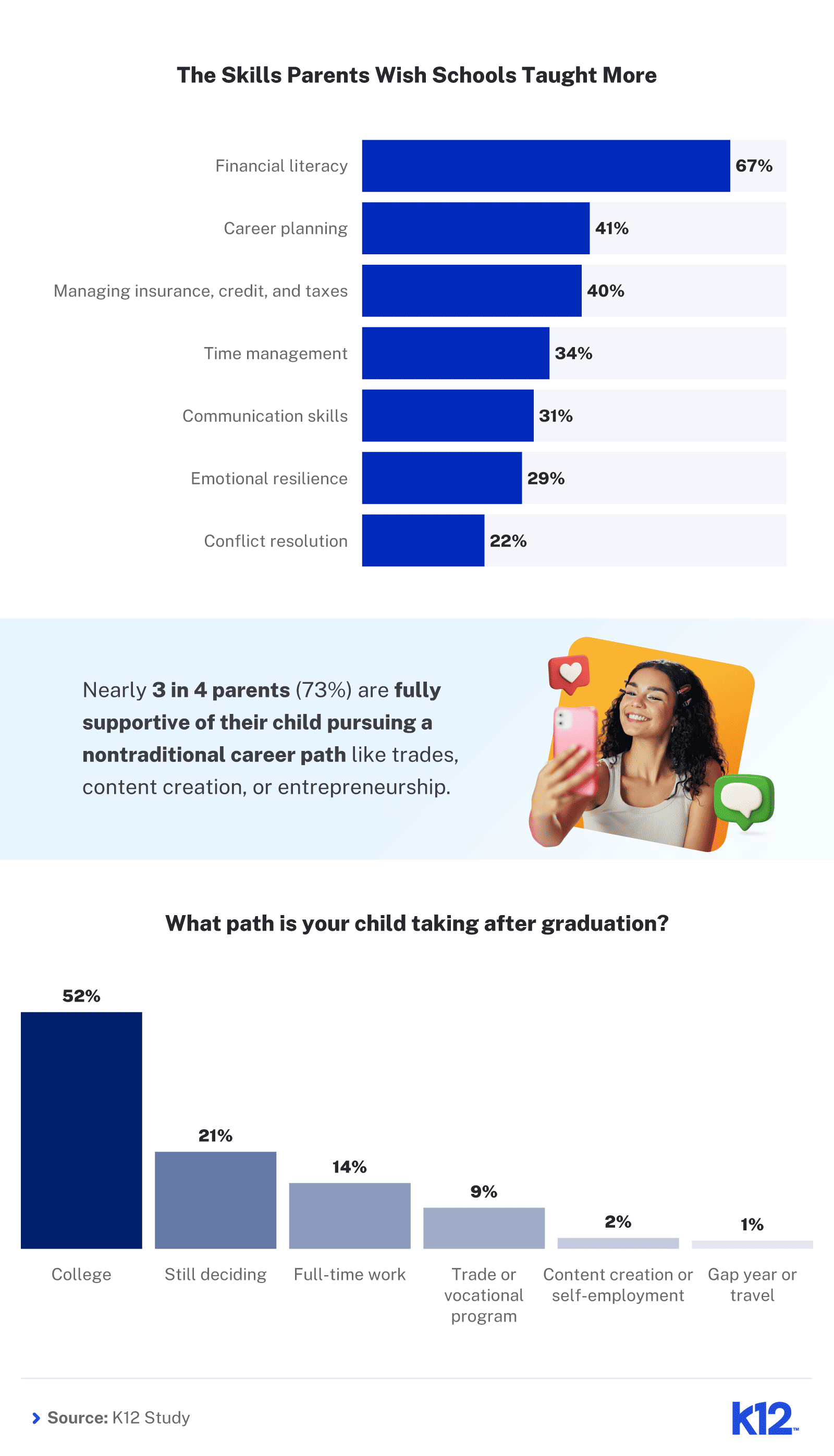High school graduation is a moment of celebration, but for many students and their parents, it also marks the beginning of an uncertain new chapter. In a new national survey commissioned by K12, 300 recent high school graduates and 200 parents, not affiliated with K12, were asked about their confidence in life after high school. The study looked at how well students felt prepared across financial, academic, social, and emotional dimensions and how their families are navigating these big life transitions. What emerged is a revealing picture of where young people feel equipped and where they still need support.
Key Takeaways
- Nearly 1 in 3 recent grads (32%) said their high school didn’t prepare them well for the real world.
- Over half (56%) said their school encouraged alternative career paths like trades, gig work, or content creation.
- Over 1 in 3 (34%) felt pressure from social media to become a content creator or entrepreneur.
- Nearly 3 in 5 (59%) said social media strongly influenced their post-graduation goals.
- Over 3 in 4 who aren’t pursuing college (76%) said they would attend if it were free.
- 71% of recent grads define success as being financially secure.
Are students really ready for life after graduation?
For many recent high school graduates, the answer is: not entirely.

About one in three recent graduates said their high school didn’t prepare them well for adult life. When we asked all grads to rate their confidence about entering adulthood on a scale from 1 to 10, responses were split. Just as many rated themselves at 3 or below as those who gave themselves an 8 or higher. In other words, feelings of uncertainty were as common as feelings of optimism. Young men reported feeling less prepared than young women, with 23% rating their confidence at 3 or below, compared to 16% of female grads.
The biggest gaps in preparedness centered around financial and practical life skills. More than half of recent grads (59%) said they didn’t feel ready to deal with credit, taxes, or insurance. Others felt least prepared for making major life decisions (48%), finding jobs (41%), staying motivated (39%), and managing money (38%). Emotional wellness was a top concern for one-third of grads who felt unready to handle stress or mental health needs. Another 32% struggled with speaking or presenting in work settings, and one in four said they weren’t ready to navigate personal or professional adult relationships.
What did recent grads wish they’d learned in high school? Filing taxes topped the list, followed closely by how credit works and how to plan for retirement. Many also longed for lessons on health insurance, budgeting, and even starting a business. Here’s the full breakdown.
Most Desired “Adulting” Skills Recent Grads Wish They’d Learned in High School
- How to file taxes: 62%
- How credit scores and loans work: 60%
- How to plan for retirement or invest: 51%
- How to navigate health insurance and doctor’s visits: 50%
- How to budget and manage money: 49%
- How to apply for jobs (resumes, cover letters, interviews): 43%
- How to start a business or be self-employed: 36%
- How to manage time and avoid procrastination: 34%
- How to manage stress and mental health: 30%
- How to communicate in professional settings: 29%
It’s clear that the next generation is eager for real-world education that bridges the gap between the classroom and adult responsibilities.
The Social Media Factor: Career Goals in the Digital Age
As recent grads step into adult life, social media is more than a pastime. It’s shaping how they view success, work, and their futures.

Nearly 60% of recent grads said social media had a strong influence on their post-graduation goals. Over one-third admitted feeling pressure to become content creators or entrepreneurs, inspired by the curated success stories they saw online. Still, recent grads aren’t facing that pressure alone. Many schools are starting to support nontraditional paths to success. More than half of recent grads (56%) said their high school encouraged students to explore alternative career paths like trades, gig work, or influencer-driven jobs.
So, what are recent grads choosing instead of college? Nearly half pursued full-time work (48%), while others opted for vocational school (21%), travel (14%), or content creation (10%). A smaller group (7%) decided to start their own business. However, many of those following a nontraditional path still saw value in higher education, with 76% saying they would choose to attend college if it were free.
When recent grads were asked how they define success, financial security topped the list at 71%. Freedom and flexibility came next at 51%, followed by doing work they love (39%) and making a difference (22%). Only 8% defined success as status or recognition. Today’s graduates are redefining success in ways that reflect their values and the world they’ve grown up in. As they look ahead, their parents are watching closely, proud but also concerned about how ready their children truly are.
Parents Share the Hope and the Hesitations
Parents are deeply invested in their children’s futures, offering encouragement while grappling with questions about what lies ahead. Their views add another layer of insight into how families are navigating the shift from high school to adulthood.

While 73% of parents said they fully support their child pursuing nontraditional careers, only 29% said they do so without any concerns. This suggests that even supportive parents may still have reservations. In fact, 71% of parents said they’ve expressed at least some worries to their children, whether gently or more directly.
When asked to rate their child’s readiness for adulthood, most gave only a 6 out of 10. Only 22% felt their child was truly ready, with a score of 8 or higher. Parents with higher incomes were more likely to believe their child was prepared for the next stage of life compared to lower-income parents (27% vs. 20%, respectively). Despite readiness worries, 84% of parents believed their children would be more successful than they were at the same age.
Parents also shared their thoughts on specific life skills. They felt most confident in their child’s communication abilities (76%), job-readiness (76%), and time-management (73%). But they expressed more concern about emotional resilience, money management, and living independently. Over four in five parents (81%) said they’ve had open conversations with their child about whether they’re ready for life after graduation.
Conclusion: A Generation in Transition
Many of today’s students are stepping into adulthood with big dreams and important questions. They’re exploring new paths, embracing different definitions of success, and looking for support that truly prepares them for the real world. Parents and caregivers are walking alongside them, hopeful but also searching for guidance. Education that focuses on both academics and life skills can make a lasting difference. When students feel prepared and supported, they gain the confidence to face whatever comes next and thrive in their own unique way.
Methodology
For this study, we surveyed 300 recent high school graduates and 200 American parents to uncover how confident grads and their families feel about the transition to adulthood; none were affiliated with K12. Among students, 59% were women, 38% were men, and 4% were non-binary. Among parents, 52% were women, and 48% were men. Due to rounding, percentages in this study may not total 100% exactly.







